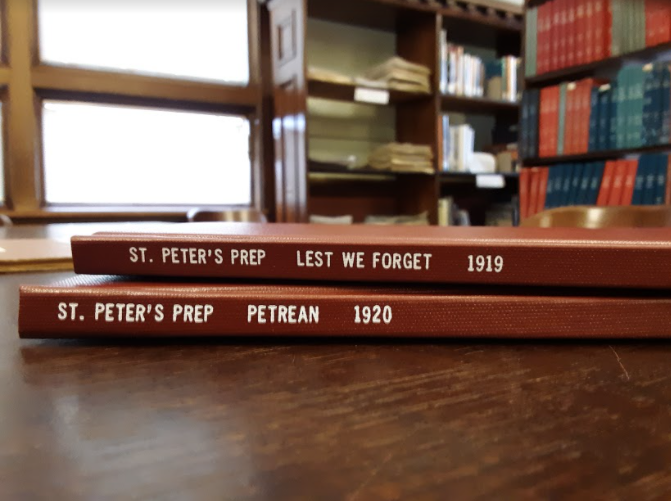War, Death, Plague, and Steamed Canines: A Retrospective into the Prep of a Hundred Years Ago
February 5, 2021
The Coronavirus Pandemic has rocked the planet and altered our way of life. Additionally, it has been accompanied by other calamities such as political unease and natural disasters. One would think that the past year has had an unprecedented sea of cataclysms — and they’d be wrong. From 1918 to 1920, humanity was mired in an Influenza epidemic, and much of the world was embroiled in World War I. This idea made me think: what were they experiencing at Prep a hundred years ago?
The first step for getting into the minds of long-dead Prep students was to find their writings and records. I began by contacting those with access into Prep’s archives; surely, there was a yearbook or memo from the time I could use? However, my efforts were ultimately fruitless. The oldest yearbook in Prep’s storage was from 1922, well after the Influenza epidemic had ended. On top of this, virtually no other records existed from the period. Knowing this, I shifted my focus to the city archives. I communicated with a librarian named John Beekman at the Jersey City Main Library on Jersey Avenue. We set up a time where I could come into the library and peruse its resources from the time period. As it happened, the library had copies of our yearbook, the Petrean from 1919 and 1920!
With a primary source in hand, I set to work on exploring the experience of Prep during the early 20th century. I began with Church and School in the Immigrant City, a dissertation on the history of Jersey City’s public education, which happened to contain the phrase “The coming of the Jesuits to Jersey City in the 1870s was arguably the single most important development in the history of public education in Jersey City” (Petrick, 109). Aside from this, however, I found little else of interest. With that out of the way, I moved on to the yearbooks, where I was greeted by a pair of introductions written by seniors of each graduating class. The first letter focused on the battles of seniors against geometry and Latin, while the latter focused on the fun memories they made. Much to my amusement, I discovered a 104-year-old inside joke, referring to hot dogs as “Steamed Canines,” likely originated by a certain senior named Joseph McCarthy.
Soon, of course, my mind drifted back to my original question: How did Prep react to the Influenza epidemic? After some searching in the 1919 yearbook, I found the only mention of the ‘flu’: From October 11th to November 4th, the school was shut down. During this time, multiple students contracted the disease and one perished from it. In the shutdown period, Prep also mourned the loss of Paul Brown, S.J., a teacher, who died on the 16th. On the 19th, he was mourned at an “impressive ceremony” by his classes. The topic with more attention was undoubtedly the war. World War I was only joined by America in late 1917, but incredibly, Prep had veterans from the war within its student ranks. These students received accolades from the yearbook writers, and some war stories were mentioned within the book’s pages. Such a student was Frank “Mac” McBride, who fought in the war, but returned to Prep after the armistice. Mac was a popular boy serving as class president in one year. He was also an aspiring playwright. His yearbook entry opens with “When school opened this September we mourned ‘Mac’ as lost to the great god Mars, but behold the lost returned, when the war clouds cleared.”
It was hard not to feel a sense of anachronism while reading these texts, as I found numerous things in these yearbooks that felt very unusual. One such disparity was multiple pages of advertisements at the end of these yearbooks. This was quite surprising to me, but even more surprising was a message asking the reader to patronize these advertisers as it would benefit the school! Another, less striking discovery was that Prep used to possess a “billiard parlor,” which is basically a pool hall on campus.
One part of Prep has remained constant, however, and that is the school song, which I was satisfied to see on a page to itself in the 1920 yearbook.


